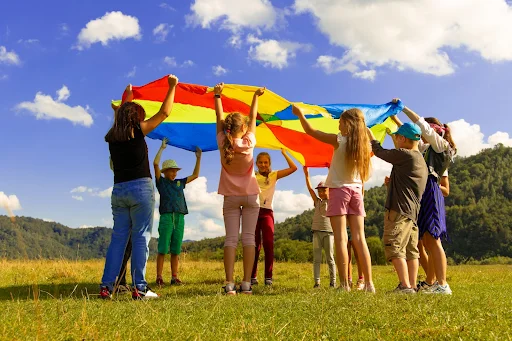Summer break is a time of both excitement and uncertainty for families. While school provides a structured environment with built-in learning, socializing, and physical activity, the summer months can leave children sedentary and isolated. Many parents wonder how to keep their children engaged, active, and happy during these long weeks. One answer lies in summer camps, where children not only stay physically active but also grow emotionally and socially. These experiences offer more than temporary entertainment; they leave lasting effects on children’s mental, physical, and emotional well-being. Sending your child to summer camp can offer benefits that ripple far beyond the season itself.
Friendships That Grow Beyond the Campfire
Children often form meaningful, lasting friendships during summer camp that might never have happened within the familiar circles of school or neighborhood. The mix of new faces and shared activities allows children to discover peers with common interests in an environment that encourages openness and cooperation. Camp gives kids a chance to start fresh socially, often revealing sides of themselves they don’t express at school. In the middle of an outdoor game, a shared craft project, or a hike through the woods, trust builds naturally. Programs like Peninsula youth programs bring together kids from different backgrounds, helping them create friendships that often continue long after camp ends. These social bonds can build confidence, reduce feelings of loneliness, and teach the subtleties of teamwork and empathy in ways that structured academics rarely do.
Physical Activity That Feels Like Play
Many children spend their school year behind desks, with movement limited to brief recesses or physical education classes. Camp flips that routine, with a day full of movement and games that don’t feel like exercise. From climbing walls to kayaking, capture-the-flag to swimming, kids spend much of their time being physically active without thinking about it in terms of fitness or goals. The body gets stronger, endurance improves, and coordination develops. The mix of structured games and free play ensures that kids of all athletic abilities can participate in a way that feels rewarding rather than pressuring. Physical activity at camp can also help improve sleep quality, regulate mood, and offer a natural outlet for stress.
Time Outdoors Supports Mental and Emotional Wellness
Being outside does something to a child’s mood that few indoor activities can match. Fresh air, trees, water, and sunshine create a setting that helps reduce stress and mental fatigue. Time spent outdoors has been linked to improved concentration, reduced anxiety, and more positive attitudes. Camp settings, often surrounded by natural beauty, give kids room to explore their world at their own pace. Without screens and indoor distractions, children learn to pay attention to their surroundings, tune into their senses, and feel more connected to the environment. This kind of awareness can calm the mind and help children feel grounded and relaxed. For kids who spend most of their year indoors or in urban settings, the contrast of camp can be powerful and refreshing.
Don’t stop here—take a look at what else we’ve got for you!
Building Confidence Through Trying New Things
At camp, children often try things they’ve never done before. Whether it’s speaking in front of a group, navigating a ropes course, or learning how to build a fire, every challenge offers a new opportunity to grow. Summer Camp counselors provide support without taking over, allowing kids to take risks and solve problems on their own. Success in these moments builds a sense of accomplishment that is hard to replicate in more controlled settings. Even when something doesn’t go perfectly, when the marshmallows burn or the canoe tips, kids learn resilience and problem-solving. Each experience, big or small, becomes part of a growing bank of self-belief. Over time, this confidence shapes how children approach new situations long after camp is over.
Disconnecting from Technology and Discovering Real-World Joy
For many kids, summer is synonymous with screen time. Hours spent on phones, tablets, or video games can crowd out the benefits of human interaction and physical movement. Camp changes that pattern. Most programs limit or prohibit screens, encouraging kids to connect with each other and the natural world. At first, this can be jarring. But within days, many children find they don’t miss their devices. They become more curious, more playful, and more engaged with the people around them. Meals become times for conversation rather than scrolling. Evenings bring stories and laughter, not digital distractions. This return to unplugged life gives kids a deeper appreciation for relationships, quiet moments, and shared experiences.
Summer camp offers more than a break from routine, it opens a world where children can move freely, think creatively, and connect deeply. Whether it’s through newfound friendships, outdoor adventures, or moments of independence, camp experiences leave an imprint that can shape a child’s growth in ways that echo throughout the year.
You’ll find even more guides and resources on 2A Magazine.







